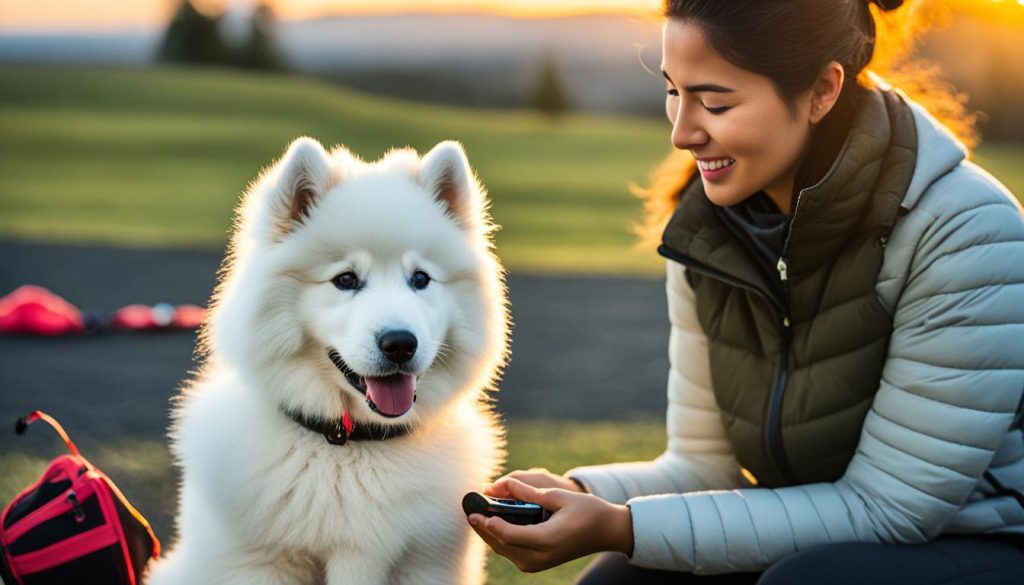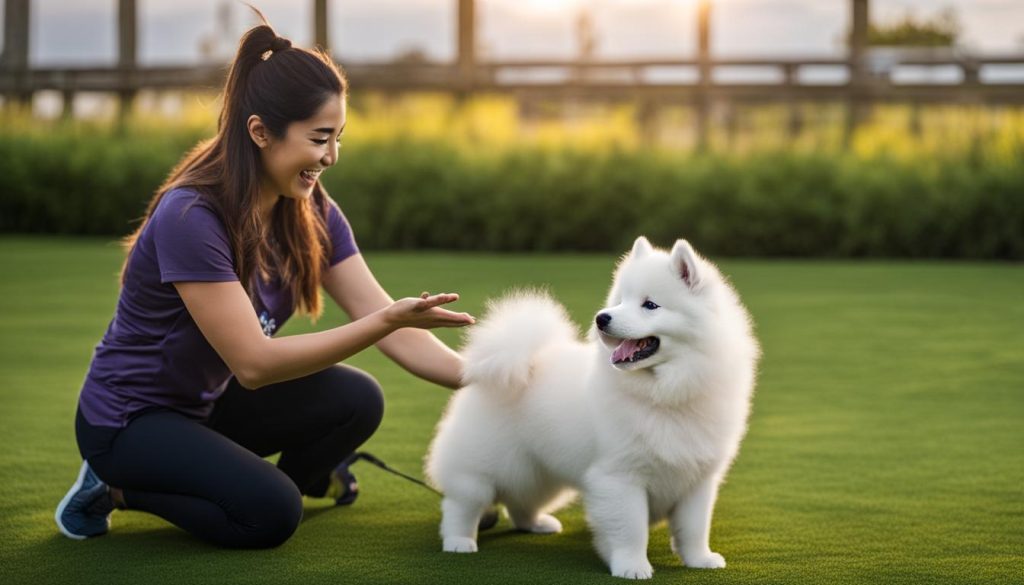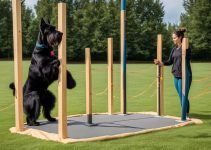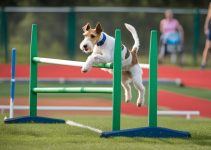Training a Samoyed can be a rewarding yet challenging experience. Known for their friendly nature and fluffy white coat, Samoyeds possess a strong-willed personality that requires effective training techniques. Whether you have a Samoyed puppy or an adult dog, it’s important to approach training with consistency, patience, and positive reinforcement.
Discover Quick and Easy Samoyed Training Techniques
- Start training your Samoyed puppy early to establish clear boundaries and teach basic obedience commands.
- Consistency is key in Samoyed training, ensuring that all household members use the same commands and rewards.
- Positive reinforcement is a powerful tool in Samoyed training, using rewards and praise to reinforce good behavior.
- Keep training sessions short and engaging, focusing on quality over quantity to maximize your Samoyed’s retention.
- Socialization is crucial for a well-behaved Samoyed, exposing them to various environments and positively redirecting unwanted behaviors.
Start Early with Samoyed Puppy Training
When it comes to training a Samoyed puppy, starting early is key. Establishing clear boundaries and teaching basic obedience commands from a young age sets the foundation for a well-behaved and obedient dog. By initiating training early on, you can make the learning process smoother and help your Samoyed puppy develop good behavior habits.
One important aspect of early puppy training is teaching basic obedience commands. Commands such as “sit,” “stay,” and “come” are essential for effective communication and control over your Samoyed. By introducing these commands early, you establish expectations and enable your puppy to understand and respond to them.
To ensure successful early puppy training, it’s important to establish clear boundaries. This includes setting rules and limitations regarding behavior, house training, and social interactions. Clear boundaries provide structure and guidance for your Samoyed puppy, helping them understand what is expected of them.
Remember, it’s never too early to start training your Samoyed puppy. Begin by incorporating short, frequent training sessions into your daily routine. Make sure to keep the sessions engaging and positive, using rewards, praise, and treats to reinforce good behavior. With patience and consistency, you can lay the groundwork for a well-trained and obedient Samoyed.
Be Consistent in Samoyed Training
Consistency is crucial when training a Samoyed. To ensure effective training, it’s important for all members of the household to use the same commands and rewards. By maintaining consistency in approach, schedule, and expectations, you can avoid confusion and provide clear guidance to your furry friend.
Using consistent commands and rewards helps your Samoyed understand and retain the desired behavior. Whether it’s “sit,” “stay,” or “heel,” using the same commands consistently reinforces their meaning and helps your canine companion understand what is expected of them.
Consistency extends beyond commands and also includes the timing and type of rewards. Make sure to use the same rewards that motivate your Samoyed, whether it’s treats, praise, or playtime. This consistency will strengthen the association between their actions and positive outcomes.
By establishing consistency in training, you create a reliable framework for your Samoyed to follow. This consistency builds trust and understanding, paving the way for a well-trained canine companion who knows exactly what is expected of them.

Benefits of Consistency in Samoyed Training:
- Reduces confusion for your Samoyed
- Reinforces the meaning of commands
- Strengthens the association between actions and rewards
- Builds trust and understanding
- Creates a well-trained and obedient companion
Positive Reinforcement in Samoyed Training
When it comes to training your Samoyed, positive reinforcement is a highly effective approach. This training method focuses on rewarding good behavior rather than punishing unwanted behaviors. By using praise, treats, or playtime as rewards, you can create a positive association for your Samoyed, making them more likely to repeat the desired behavior in the future.
Positive reinforcement not only strengthens the bond between you and your Samoyed but also enhances their motivation to learn and obey commands. It promotes a cooperative and happy training environment, fostering a relationship built on trust and mutual respect.
Using praise as a form of positive reinforcement is simple yet impactful. When your Samoyed follows a command or exhibits good behavior, offer verbal praise such as “Good boy!” or “Well done!” in an enthusiastic tone. This immediate acknowledgment lets them know that they’re doing something right and reinforces the desired behavior.
In addition to verbal praise, treats are another valuable tool for positive reinforcement. Choose small, soft treats that your Samoyed finds particularly enticing. When they perform a desired behavior or successfully complete a command, reward them with a treat. This positive association between good behavior and tasty rewards reinforces their inclination to repeat the behavior.
Playtime is also an excellent way to reward your Samoyed for their obedience and good behavior. Engage in interactive games, such as fetch or tug-of-war, as a fun and stimulating form of positive reinforcement. Not only does this provide an opportunity for physical exercise but it also strengthens the bond between you and your furry companion.
Benefits of Positive Reinforcement Training
Positive reinforcement training offers numerous benefits for both you and your Samoyed. It creates a positive and enjoyable training experience, making your Samoyed more eager to participate in training sessions. With consistent positive reinforcement, your Samoyed can quickly learn and retain commands, helping them become a well-behaved and obedient pet.
Compared to punishment-based methods, positive reinforcement training promotes a harmonious and trusting relationship with your Samoyed. It builds their confidence and self-esteem while minimizing any fear or anxiety associated with training. Positive reinforcement also helps in effectively addressing behavioral issues by redirecting your Samoyed’s focus towards desired behaviors.
So, whether you’re teaching basic commands or addressing specific behavioral concerns, positive reinforcement training is a gentle yet powerful technique to guide your Samoyed towards becoming a well-trained and happy companion.
Short and Engaging Training Sessions with Samoyeds
Puppies have a limited attention span, so it’s important to keep training sessions short and engaging. Aim for 10-15 minute sessions, 2-3 times a day. This helps your Samoyed remain focused and better retain the information. Quality over quantity is key in successful training sessions.
When training your Samoyed, it’s essential to make the most out of those short sessions by providing focused and effective training. Here are some tips to ensure your training sessions are engaging and yield the best results:
- Choose the right time: Find a time of day when your Samoyed is most alert and receptive to training. This could be after a short play session or when they’re not too tired.
- Eliminate distractions: Create a calm and quiet environment for training. Turn off the TV or loud music and remove any toys or other distractions that may divert your pup’s attention.
- Break it down: Focus on one command or behavior per training session. This allows your Samoyed to fully understand and practice one skill before moving on to the next.
- Use positive reinforcement: Reward your Samoyed with praise, treats, or playtime when they successfully perform the desired behavior. This encourages them to continue learning and reinforces their understanding of what you expect from them.
- Keep it fun: Incorporate games and interactive activities into your training sessions to make them enjoyable for your Samoyed. This keeps their attention and enthusiasm high, making the learning process more effective.
Remember, short training sessions provide focused and retained information for your Samoyed. By keeping the sessions engaging and following these tips, you’ll set the foundation for a well-trained and happy pup.

Socialization and Redirection in Samoyed Training
Proper socialization is a critical aspect of Samoyed training. It is essential to expose your Samoyed puppy to different environments, various people, and other animals to help them develop confidence and learn appropriate behavior. Socialization plays a key role in preventing unwanted behaviors and creating a well-rounded and sociable dog.
When socializing your Samoyed, it’s important to gradually introduce them to new experiences. Start with controlled environments, such as your home or a quiet park, and gradually expose them to busier places with more distractions. This gradual exposure will help your Samoyed adjust and build positive associations with new situations.
Introducing your Samoyed to different people is also essential for socialization. Encourage your friends and family members to interact with your puppy in a positive and gentle manner. This will help your dog become comfortable around different individuals and prevent fear or aggressive behaviors in the future.
Interactions with other animals are equally important in socializing your Samoyed. Set up playdates with friendly and well-socialized dogs, or enroll your puppy in supervised group training classes. These experiences will teach your Samoyed how to interact appropriately with other animals and prevent any aggressive tendencies.
Redirection techniques are crucial when dealing with unwanted behaviors in your Samoyed. Instead of resorting to punishment, redirect their attention towards a more desirable behavior. For example, if your Samoyed starts chewing on furniture, redirect their attention to a chew toy by removing the furniture from their reach and providing them with an appropriate alternative.
Redirecting unwanted behaviors not only prevents your Samoyed from engaging in destructive actions but also reinforces positive behaviors. By teaching your Samoyed what is expected of them and rewarding the appropriate behavior, you can effectively shape their behavior and prevent future problems.
Remember, socialization and redirection are ongoing processes throughout your Samoyed’s life. Consistency, patience, and positive reinforcement will help you build a strong bond with your furry friend, ensuring they grow up to be well-behaved and well-adjusted dogs.
- Expose your Samoyed to different environments, people, and animals for proper socialization
- Gradually introduce them to new experiences and locations to build confidence
- Encourage positive interactions with various individuals to prevent fear or aggression
- Arrange playdates or enroll in group training classes to socialize with other animals
- Use redirection techniques to prevent unwanted behaviors instead of punishment
- Redirect their attention to a more desirable behavior or activity
- Consistency, patience, and positive reinforcement are key in shaping your Samoyed’s behavior
Conclusion
Training a Samoyed requires time, effort, and dedication, but the rewards are worth it. By implementing effective samoyed training methods and techniques outlined in this article, you can develop a strong bond with your furry friend. Patience and dedication are essential as you navigate through the training process, ensuring that you set realistic expectations for your Samoyed’s progress.
Remember, building a strong bond with your Samoyed is not only about obedience but also about trust and mutual respect. By using positive reinforcement, consistent commands, and rewarding good behavior, you can create a positive learning environment for your Samoyed. This approach not only helps them understand the desired behaviors but also strengthens the bond between you and your furry companion.
However, in some cases, seeking professional help may be necessary, especially if you encounter challenges or specific behavioral issues. Professional trainers have the expertise to address specific training needs and provide personalized guidance. They can offer valuable insights and techniques to overcome any hurdles you may face during the training process.
Training your Samoyed requires patience, dedication, and a commitment to building a strong relationship. With the right training methods and consistent effort, you can have a well-behaved, obedient, and loving companion by your side. Remember to be patient, stay consistent, and seek professional help when needed – together, you and your Samoyed can achieve great success in training and enjoy a harmonious life together.
FAQ
What are some effective training techniques for Samoyeds?
Effective training techniques for Samoyeds include starting early, being consistent, and using positive reinforcement. Short and engaging training sessions, proper socialization, and redirection of unwanted behaviors are also important.
Why is it important to start early with Samoyed puppy training?
Starting early with Samoyed puppy training establishes clear boundaries and teaches basic obedience commands. Training early on helps set expectations and makes the training process smoother.
How important is consistency in Samoyed training?
Consistency is key in Samoyed training. All members of the household should use the same commands and rewards to avoid confusion. Consistency in approach, schedule, and expectations helps in training a well-behaved Samoyed.
What is the role of positive reinforcement in Samoyed training?
Positive reinforcement is a powerful tool in Samoyed training. Rewarding good behavior with praise, treats, or playtime helps the Samoyed associate positive outcomes with the desired behavior, and increases the likelihood of them repeating the behavior in the future.
How long should training sessions be for Samoyeds?
Training sessions for Samoyeds should be short and engaging. Aim for 10-15 minute sessions, 2-3 times a day. This helps the Samoyed remain focused and better retain the information.
Why is socialization important in Samoyed training?
Proper socialization is critical in Samoyed training. Exposing the Samoyed puppy to various environments, people, and other animals helps them develop confidence and learn appropriate behavior. Additionally, redirecting unwanted behaviors instead of punishing them is more effective.
What is the ideal way to train a Samoyed?
Training a Samoyed takes time, effort, and dedication. It’s important to be patient, set realistic expectations, and seek professional help if needed. By following the tips and techniques outlined, Samoyed owners can build a strong bond based on trust and mutual respect.






